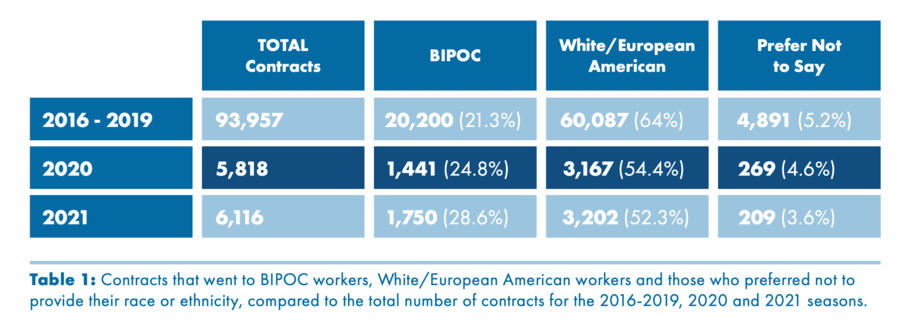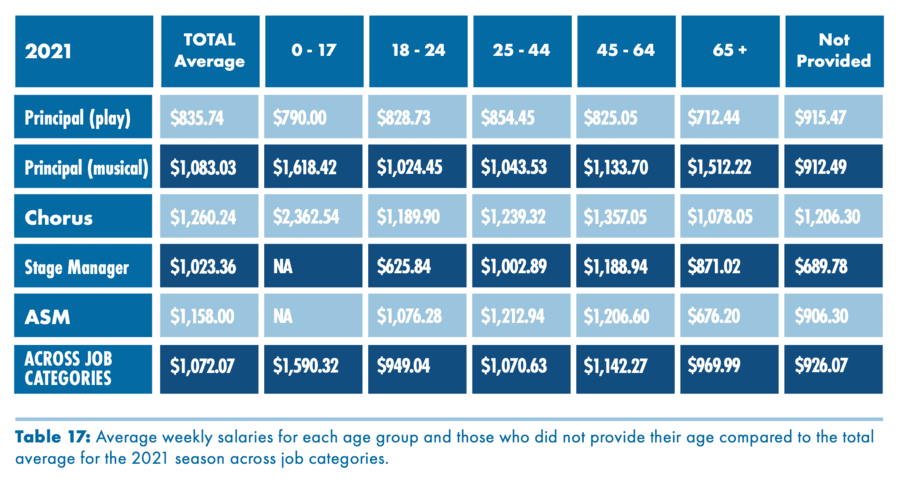NEW YORK CITY: Actors’ Equity Association (AEA) has published “Progress During an Atypical Year,” a new report on hiring bias and wage gaps in theatre in 2021. The document examines employment opportunity and average salaries for union members in 2021. The report is available for download.
“We see some encouraging trends in this report,” AEA executive director Al Vincent Jr. said in a statement. “The theatre industry has real potential to be a beacon of diversity and inclusion, and having this data helps us better advocate for our members. We still have a ways to go, and we urge employers to keep these findings in mind when programming a season and hiring stage managers and actors.”
The 2021 report analyzes the distribution of new contracts and the average weekly salaries among six identity categories: race and ethnicity, gender, age, sexual orientation, disability, and veteran status. The report also examines intersections of some of the identity categories, including age and race, age and gender, and race and gender, to see how the distributions shift.
The survey shows that there has been a steady though small increase in job opportunities for union members who identify as Black, Indigenous, or people of color (BIPOC), although this process is unevenly distributed across different types of Equity contracts. For example, 28.6 percent of all contracts were awarded to BIPOC union members, as compared to 24.8 percent in 2020 and 21.3 percent from 2016-2019. (The report acknowledges that the pandemic’s partial shutdown of the industry affected the data.) The report also notes that “the types of contracts that are made available to BIPOC workers” is smaller than those offered to white union members: “BIPOC workers are employed with less frequency on more entry-point jobs in the industry, such as Small Professional Theater, lower-tiered LORT, and chorus contracts.”

The report also shows that though there has been little change between the percentage of new contracts that went to men and women in the last several years, the number of new contracts that have gone to nonbinary union members has risen: 0.9 percent of contracts were given to nonbinary union members in 2021, higher than the percentage of nonbinary individuals in the United States, which is 0.4 percent. AEA notes that this number is “still statistically insignificant when compared to the contracts given to other genders.”
Additionally, the report shows that the number of new contracts issued to both actors and stage managers above the age of 44 is significantly less than those issued to younger members, and that this is exacerbated for Equity members with marginalized identities, including BIPOC workers. The report shows that weekly salaries for assistant stage managers is lower for workers above the age of 45 than it is for those between the ages of 25-44.

“Transforming our industry is a group project, as well as a long game,” AEA president Kate Shindle said in a statement. “It’s my hope that the data presented here will inspire all of us working for change to consider how we can level the playing field within our own spheres of influence.”
Equity members can help make future reports as accurate as possible by supplying demographic information through the union’s self-identification form in the member portal. Individual responses remain anonymous. Equity has been tracking the distribution of new contracts and average weekly salaries since 2013, and has issued four reports.
Actors’ Equity Association is the U.S. labor union that represents more than 51,000 professional actors and stage managers. Founded in 1913, AEA endeavors to advance the careers of its members by negotiating wages, improving working conditions, and providing a wide range of benefits.


